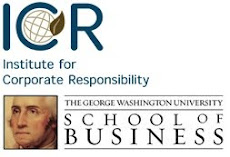It's 11 a.m. on May 20 in Seoul, South Korea, and 10 students from the George Washington University MBA, including myself, are frantically scrambling to put the finishing touches on a presentation we are scheduled to deliver in three hours. We worked for seven weeks back home in Washington, D.C., researching the wind turbine business and had already spent two weeks in South Korea consulting with Hyosung to develop a strategy to expand its turbine manufacturing business in Korea, Latin America, and the U.S. With just hours until two senior vice-presidents of the wind business are scheduled to arrive at our hotel's conference room, we are still tweaking PowerPoint slides and fine-tuning our oral delivery of slide content.
This is the culmination of my first year in GW's Global MBA program, and like the year that has just preceded it, it's ending with a flurry of activity and a rapid coordination of efforts. Armed with the tools of finance, supply chain management, business strategy, international management, business communications, macroeconomics, and marketing—all part of our recently completed first-year core classes—our team works together seamlessly to add the finishing touches to aid in the delivery of a set of recommendations we hope can help Hyosung achieve its goal of becoming one of the top 10 global providers of wind energy solutions by 2017.
For me, the opportunity to consult in an international setting was one of the driving forces in my decision to attend GW. This residency was more than just a field trip after a 14-hour flight. It was a consulting engagement at its heart and a good opportunity to employ the business skills we have developed over the past year. I chose the trip to Korea over other trip options to India, Sweden, Serbia, and Mexico, because its focus on the intersection of business and public policy and the development of renewable energy resources so closely aligns with my career goals. While my excitement grew as the trip approached, my wildest expectations couldn't have prepared me for the learning experience, networking opportunities, and sheer enjoyment I was so fortunate to get during GW's international residency project in Seoul.
FROM WIND TURBINES TO CHICKEN FEET
The focus of our trip was exploring South Korea's green growth strategy. Korea has pledged to stimulate its economy through the development of green technologies and innovation. Twenty GW students were on the trip, divided in two teams. While 10 of us worked with Hyosung on wind turbines, the other 10 consulted with SK Energy on the development of lithium ion batteries, which will be used to power a new fleet of electric vehicles worldwide.
Both of these projects provided ample opportunities to apply practical MBA skills to new industries. But beyond the education, this trip was an amazingly good time characterized by karaoke nights, Korean baseball, sleep dancing (what happens at 6 a.m. at the club when your mind and body shut down on the dance floor), chicken feet, and more soju than I care to remember. Shepherded down the streets of Seoul by our faithful TA and patient guide, Sungha, all 20 GW MBAs made the most of this incredible opportunity, and I believe all of us are significantly better off after this experience.
I think what truly made the trip such a success was the leadership of our professor and guide, Danny Leipziger. Simply put, Leipziger is a rock star in Korea. He joined GW's MBA faculty in 1997 after a long career at the World Bank, where he led the bank's first economic recovery loan to South Korea after the Asian financial crisis. While we were in South Korea, Leipziger set up a series of meetings with various officials, economists, assemblymen, business leaders, and media personnel. The meetings complemented the work we were doing with our client companies as they worked to respond to the public policy push for green innovations.
GW has a significant network of more than 800 alumni in Korea. Several of these alumni stepped forward to act as our gracious and extremely generous hosts. The success of these individuals and their insights into the Korean business culture served as both inspiration and education when they hosted a 20-course traditional Korean meal, a night reminiscent of D.C. power dining at a Western-style steak house, and topped it off with VIP entrance and table service at one of Seoul's hottest nightclubs. This friendliness will not soon be forgotten, and my classmates and I look forward to continuing to build on the relationships and networks we developed on our trip.
This trip demonstrated the value of an MBA, as I was able to apply the skills I have acquired over the past year. I have become a better communicator and team player, and I'm better versed in the multiple functional areas of business that are required to become a leader in management and a fine strategist to others. The trip exemplified the Seoul—err, soul—of business school, which I would characterize as the combined application of existing knowledge while simultaneously obtaining experience in new subject matters.
Personally, I am broadening my knowledge of the energy industry as I prepare to become a champion for demonstrating the financial value that can be derived when businesses embrace environmental sustainability. Going to Seoul was the perfect capstone to an incredible first year of business school. After our two distinguished guests departed following our presentation, I can look back now with confidence that we provided them with several viable strategies and ideas that I hope will help them grow as much as we have during this incredible experience.
Jeremy Dommu Global MBA, 2011
*This is taken from his Businessweek Blog




